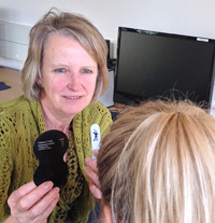New eye strain research relieves stress for revising students
Release Date 14 May 2014

Students who experience eyesight problems while hitting the books this summer results could be saved additional stress thanks to new University of Reading research.
A study led by Dr Anna Horwood has found that eye strain is common when studying hard, and that simple ‘at-home' exercises improved eye focus by up to 15% more than intense prescribed treatments. The results should allay fears of students whose eyes give them problems while revising, and shows that urgent and potentially costly trips to eye care professionals are not usually necessary.
Strained or tired eyes affect around 5-8% of the population. It's a particular problem for schoolchildren or students when revising as they conduct more close work for longer periods than normal. Research¹ estimates that up to 32% of university students could suffer from eye strain, but are students experiencing an actual ‘eye problem', such as difficulty with converging eyes to look at close things, or just a consequence of near and intense work during a stressful period?
The study involved 167 students (aged 18 to 25) who reported ‘normal eyesight' and who had never sought advice or help for eye strain. They were first asked about any symptoms they noticed during close work and then had their eyes tested. They had their eye balance and ability to focus carefully checked and measured, before being randomly allocated six different courses of exercises, used to target specific eye problems, as well as a placebo.
Dr Horwood, from the University of Reading's Department of Psychology and a qualified orthoptist, said: "This time of year is particularly stressful for students and parents. Eye strain or tired eyes can be very disconcerting, while trips to the opticians or the hospital, or even just remembering to undertake complicated exercises, are unwanted distractions during exam time. Through two studies we aimed to discover when and how eye care professionals should be called upon and which types of eye exercises could benefit students the most.
"Our research showed that symptoms may occur just from studying too long, when tired, in bad light or simply because the work is being found to be difficult. So revising students should not worry as issues are not necessarily related to specific eye problems."
Dr Horwood and her team found that simple eye-care exercises are the most effective and warned that prescribed exercises don't work immediately.
Dr Horwood continued: "The tried and tested method of practising to look at something the end of your nose proved significantly more effective than complex methods traditionally thought to be better. Surprisingly a further group who hadn't done any exercises at all, but who were simply encouraged to try harder by the tester, showed the most improvement. This group improved many aspects of their eye muscle power by 15% compared to groups carrying out a fortnight of three-times-a-day exercises.
"So if you experience headaches, tired eyes or blurred vision when revising the best advice is to take regular short breaks, shutting your eyes or looking out of the window. Checking your smartphone is not a break! It's important to note that if you have a genuine eye problem prescribed exercises may take a few weeks to work, and sometimes make symptoms worse to begin with. If the symptoms persist then definitely go for an eye test, but after your exam.
"As long as your eyes are professionally tested from time to time, there's no need to worry about your eyesight while studying...until it worries you."
Dr Horwood's research was published in a series of papers² earlier this year.
ENDS
Notes for Editors
¹ Porcar E, Martinez-Palomera A. Prevalence of general binocular dysfunctions in a population of university students. Optom Vis Sci 1997;74:111-3.
²
- Horwood A, Toor S, Riddell P. Screening for convergence insufficiency using the CISS is not indicated in young adults. Brit J Ophthalmol February 2014 DOI 10.1136/bjophthalmol-2013-304533 http://bjo.bmj.com/content/early/2014/02/14/bjophthalmol-2013-304533.full.pdf
- Horwood, A, Toor,S , Riddell P Change in Convergence and Accommodation After Two Weeks of Eye Exercises in Typical Young Adults JAAPOS 2014. Published online 28 Feb 2014 http://dx.doi.org/10.1016/j.jaapos.2013.11.008
- Horwood,A, Toor,S. Clinical test responses to different orthoptic exercise regimes in typical young adults Ophthalmic & Physiological Optics 2014, 34(2), 250-262. Published online 29 JAN 2014 DOI: 10.1111/opo.12109 http://onlinelibrary.wiley.com/doi/10.1111/opo.12109/full
